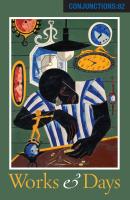Contributor History
- Favored by Strange Gods: A Selection of Letters to Joanna Russ, Conjunctions:67
Biography
Alice Bradley Sheldon (1915–1987), aka James Tiptree, Jr., aka Raccoona Sheldon, grew up traveling with her parents through regions such as India and central Africa. In the 1940s and 1950s, she worked as an Air Force photointelligence officer and for the CIA, before publishing her first short story in 1968. Writing under a male pseudonym for twenty years, Sheldon had a revolutionary effect on the science fiction of the 1970s and 1980s in her exploration of political—and especially fem- inist—themes. The many books she published during her lifetime include Ten Thousand Light-Years from Home (Eyre Methuen), Star Songs of an Old Primate (Del Rey), Up the Walls of the World (Berkley Books), Tales of the Quintana Roo (Arkham House), and Crown of Stars (Tor). Avowedly a lesbian (among other, more complicated orientations), she nevertheless enjoyed a close marriage of four decades with her husband, Huntington D. Sheldon. In 1987, with both spouses in ill health, Sheldon shot her husband and herself, having predicted her eventual suicide for many years. In 1991, the annual James Tiptree Jr. Award was created in her honor to recognize a work of science fiction or fantasy that expands or explores understandings of gender. Tachyon published an omnibus collection of her stories, Her Smoke Rose Up Forever, in 1994; and Open Road Media released the Kindle edition of Brightness Falls from the Air in 2014. Her honors include two Hugo Awards, three Nebula Awards, and posthumous induction into the Science Fiction Hall of Fame.
